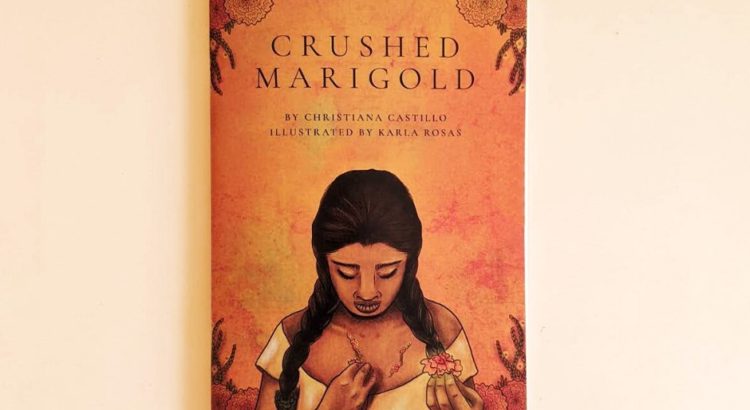Crushed Marigold is a bountiful expression of love. That was the first thought that came to mind as I read the final words of this poetry chapbook. The warmth and power of Christiana Castillo’s words are radiant, inviting the reader into her story of healing, gratitude, and celebration of roots.
Castillo is part of one of my most treasured U-M communities: my cohort of future educators. Born in Brazil and currently based out of the Detroit area, she is a Latina/Chicana poet, teaching artist, and gardener. Her contributions to class discussions are always eloquent and meaningful, so when I heard she was publishing a collection of poetry, I knew I would be excited to read it.
The words, both in English and in Spanish, spill onto the page in different shapes and decorate the page with text. When read aloud, these shapes of text create rhythms that change from page to page, rhythms that help tell the stories of each poem. Additionally, the colorful illustrations reinforce the imagery of Castillo’s poetry. Karla Rosas’s whimsical and expressive strokes perfectly capture the imagery and character of each poem.
 Throughout the chapbook, the repetition of “mija” emphasizes a love for community, for family, for tradition, and for brown girls. This love is further sustained by a sense of intergenerational connection that feels deeply sacred and deeply feminine. Many poems in the collection are told through the voice of the Castillo’s grandmother. “Life is buzzing within you mija, / you can transform your hands to carry rain drops. / You can remove withered leaves and make room for new life” (26). These words create vivid images of the beauty of nature and the beauty of self.
Throughout the chapbook, the repetition of “mija” emphasizes a love for community, for family, for tradition, and for brown girls. This love is further sustained by a sense of intergenerational connection that feels deeply sacred and deeply feminine. Many poems in the collection are told through the voice of the Castillo’s grandmother. “Life is buzzing within you mija, / you can transform your hands to carry rain drops. / You can remove withered leaves and make room for new life” (26). These words create vivid images of the beauty of nature and the beauty of self.
Here, we see that themes of connectedness and femininity extend not only to family and community, but also to the earth. Crushed Marigold urges readers to notice the nature around them that embraces and blesses them every day. Poetry that emphasizes gratitude gives me a feeling of wholeness and grounding, and Castillo’s words do just that.
While moments in the collection serve as poignant reminders of displacement, loss, and oppression, resilience is woven into each page. One of the ways that Crushed Marigold seeks to cultivate this sacred resilience is through self-love, as depicted in the comparison of the female body to a shrine. Here, we see the body connected to history and holiness. This empowering, metaphorical image asserts that one’s heart and body are worthy of abundant respect and love.
As a whole, Crushed Marigold is a blessing, it is community, it is resistance to colonization, and it harbors an immense love for womxn--especially for brown girls.
Crushed Marigold is available for purchase: www.flowerflowerpress.press/shop/crushed-marigold
Read about the poet: www.christianacastillo.com/






